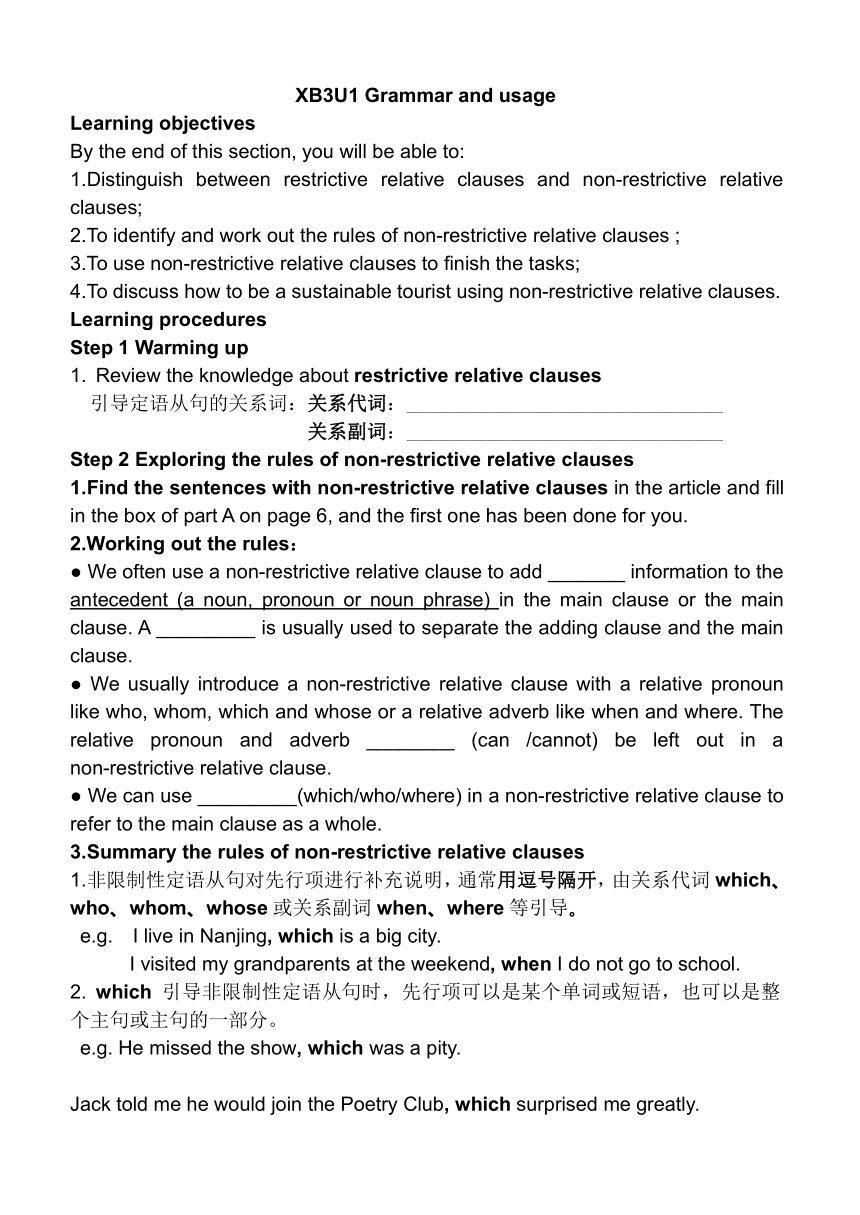译林版(2019)选择性必修 第三册Unit 1 Wish you were here Grammar and usage 导学案(无答案)
文档属性
| 名称 | 译林版(2019)选择性必修 第三册Unit 1 Wish you were here Grammar and usage 导学案(无答案) |  | |
| 格式 | docx | ||
| 文件大小 | 99.1KB | ||
| 资源类型 | 教案 | ||
| 版本资源 | 牛津译林版(2019) | ||
| 科目 | 英语 | ||
| 更新时间 | 2025-02-12 09:13:58 | ||
图片预览

文档简介
XB3U1 Grammar and usage
Learning objectives
By the end of this section, you will be able to:
1.Distinguish between restrictive relative clauses and non-restrictive relative clauses;
2.To identify and work out the rules of non-restrictive relative clauses ;
3.To use non-restrictive relative clauses to finish the tasks;
4.To discuss how to be a sustainable tourist using non-restrictive relative clauses.
Learning procedures
Step 1 Warming up
Review the knowledge about restrictive relative clauses
引导定语从句的关系词:关系代词:________________________________
关系副词:________________________________
Step 2 Exploring the rules of non-restrictive relative clauses
1.Find the sentences with non-restrictive relative clauses in the article and fill in the box of part A on page 6, and the first one has been done for you.
2.Working out the rules:
● We often use a non-restrictive relative clause to add _______ information to the antecedent (a noun, pronoun or noun phrase) in the main clause or the main clause. A _________ is usually used to separate the adding clause and the main clause.
● We usually introduce a non-restrictive relative clause with a relative pronoun like who, whom, which and whose or a relative adverb like when and where. The relative pronoun and adverb ________ (can /cannot) be left out in a non-restrictive relative clause.
● We can use _________(which/who/where) in a non-restrictive relative clause to refer to the main clause as a whole.
3.Summary the rules of non-restrictive relative clauses
1.非限制性定语从句对先行项进行补充说明,通常用逗号隔开,由关系代词which、who、whom、whose或关系副词when、where等引导。
e.g. I live in Nanjing, which is a big city.
I visited my grandparents at the weekend, when I do not go to school.
which 引导非限制性定语从句时,先行项可以是某个单词或短语,也可以是整个主句或主句的一部分。
e.g. He missed the show, which was a pity.
Jack told me he would join the Poetry Club, which surprised me greatly.
3.在非限制性定语从句中,whom、which前面可以加some/ many/ all of等修饰词,表示整体中的部分或所有。
e.g. Many people, some of whom are not overweight, are going on a diet.
4.as引导非限制性定语从句时,先行项可以是整个主句或主句的一部分。as引导的从句可以置于主句前、主句中或主句后。
e.g. As is know to all, the Moon travels around the Earth.
Step3 Applying the rules: Finish B1 and B2 on page7.
Step4 Discussion in pairs: discuss more ways to be a sustainable tourist, using non-restrictive relative clauses.
Step5 Consolidation (根据句意填关系词)
1) I live in Nanjing, ________is a big city.
2) I like my English teacher, _______ speaks good English.
3) I visit my grandparents at the weekend, ________ I do not go to school.
4) Many people, some of __________ are not overweight, are going on a diet.
5) John told me he would join the Poetry Club, _______ surprised me greatly.
6) _____ is known to all, the Moon travels around the Earth.
7) The boy was away from home for a week, _______________ ____________________(这使他父母很担心).
8) The fire lasted for a whole night, _____________________________(这造成了极大的破坏).
Learning objectives
By the end of this section, you will be able to:
1.Distinguish between restrictive relative clauses and non-restrictive relative clauses;
2.To identify and work out the rules of non-restrictive relative clauses ;
3.To use non-restrictive relative clauses to finish the tasks;
4.To discuss how to be a sustainable tourist using non-restrictive relative clauses.
Learning procedures
Step 1 Warming up
Review the knowledge about restrictive relative clauses
引导定语从句的关系词:关系代词:________________________________
关系副词:________________________________
Step 2 Exploring the rules of non-restrictive relative clauses
1.Find the sentences with non-restrictive relative clauses in the article and fill in the box of part A on page 6, and the first one has been done for you.
2.Working out the rules:
● We often use a non-restrictive relative clause to add _______ information to the antecedent (a noun, pronoun or noun phrase) in the main clause or the main clause. A _________ is usually used to separate the adding clause and the main clause.
● We usually introduce a non-restrictive relative clause with a relative pronoun like who, whom, which and whose or a relative adverb like when and where. The relative pronoun and adverb ________ (can /cannot) be left out in a non-restrictive relative clause.
● We can use _________(which/who/where) in a non-restrictive relative clause to refer to the main clause as a whole.
3.Summary the rules of non-restrictive relative clauses
1.非限制性定语从句对先行项进行补充说明,通常用逗号隔开,由关系代词which、who、whom、whose或关系副词when、where等引导。
e.g. I live in Nanjing, which is a big city.
I visited my grandparents at the weekend, when I do not go to school.
which 引导非限制性定语从句时,先行项可以是某个单词或短语,也可以是整个主句或主句的一部分。
e.g. He missed the show, which was a pity.
Jack told me he would join the Poetry Club, which surprised me greatly.
3.在非限制性定语从句中,whom、which前面可以加some/ many/ all of等修饰词,表示整体中的部分或所有。
e.g. Many people, some of whom are not overweight, are going on a diet.
4.as引导非限制性定语从句时,先行项可以是整个主句或主句的一部分。as引导的从句可以置于主句前、主句中或主句后。
e.g. As is know to all, the Moon travels around the Earth.
Step3 Applying the rules: Finish B1 and B2 on page7.
Step4 Discussion in pairs: discuss more ways to be a sustainable tourist, using non-restrictive relative clauses.
Step5 Consolidation (根据句意填关系词)
1) I live in Nanjing, ________is a big city.
2) I like my English teacher, _______ speaks good English.
3) I visit my grandparents at the weekend, ________ I do not go to school.
4) Many people, some of __________ are not overweight, are going on a diet.
5) John told me he would join the Poetry Club, _______ surprised me greatly.
6) _____ is known to all, the Moon travels around the Earth.
7) The boy was away from home for a week, _______________ ____________________(这使他父母很担心).
8) The fire lasted for a whole night, _____________________________(这造成了极大的破坏).
同课章节目录
